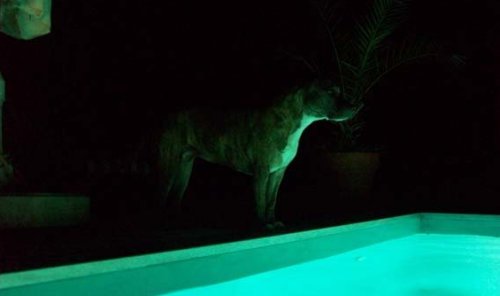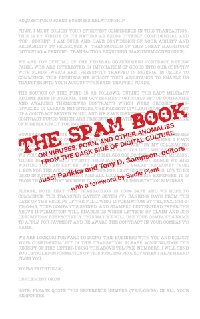
The word says it all – but only at second glance: Selfregulation means “Don’t dare”, “You better…”, “You can do it on your own or we will do it for you” – it’s just a euphemism for early submission and voluntary slavery. But it seems to be a common idea to talk about regulation, too, if the actual topic is online media and trust.
The german Hans Bredow Institute for Media Research (University Hamburg) published a reader on trust in contents and the means foster trust. Several experts describe online media, discuss some challenges (advertising, young users, the right to counterstatements) and largely present means, strategies and practices for selfregulation.
There are a few things that I consider as truly remarkable:
- The book deals with new online media, but there is not even a preview or a summary online, you have to buy it.
- The accompanying website that is still promoted from the institures website is not online – the url takes you to a domain registrar.
- The reader dedicates more than 200 pages to describe how to regulate – but 7 lines on the question why regulation is necessary, which targets should be achieved and what regulation should be good for.
- And a few times, they even mention collaboration and wiki-style collaboration with users as a means for regulation.
Ok, one goal that is also described in the title, is that to build trust. But again – what for?
This takes us to a few interesting assumptions that are hidden somewhere deep in the basics of the regulatory discussion:
#1: Whom to address with regulation efforts?
Number one: Government representatives obviously really and truly think that they should and can regulate online media and the internet. No wonder that this position is unquestioned throughout all contributions in this book – it is the summary of a government/EU-sponsored conference -, but I consider it as really strange that some participating scientists and representatives think it may be necessary or even new to recommend the participation of the industry in regulation. After all, they might know something about their business.
Leaving everything to “the industry” of course is not an option either. But it is one of the key achievements of online media, e commerce and a slight, beginnig change in spirit, that there is not “the industry” anymore. Especially in the media business, but also in the brick and mortar businesses and even in retail, attitudes, business models and business goals change.
The “old”, profit oriented industry is the main contact for regulators – they have the visible impact, they have defined the rules of the business so far, and they have the power to be really harmful: be it through mental or chemical pollution, by creating economic dependencies or by controlling too big pieces of the cake.
Regulating the old industries by reducing a bit of the quantity and impact of their business, but confirming the general way they do business, will not help to develop new ways of cooperation, sharing or sustainable business. It will keep everything as it is, maybe it will help those who claim to be powerful to feel a little bit more comfortable.
Another way is to support the “other industry” in doing business. This is not a matter of donating money or investing a little bit in technology projects. This is a matter of creating regulations and support-structures that empower people to do business. It does not have to be difficult to get something started – there should bot be minimum limits of turnover businesses have to deliver in order to be businesses (and part of a social insurance system). – Why do some european cities have an abundant culture of restaurants from all over the world, whereas others only have fast food and high class cuisine? Why do some 25 year olds have a long list of activities in their CV, and others only an education?
Regulating the “other” industries is something that governments can’t do. This will create boring islands or it will again support the mainstream only. Creating prerequisites to do different business is a far more promising challenge for both governments and the old industry, if they want to participate.
#2: What kind of trust is built by regulation?
The first point dealt with what and how to regulate. Now I want to question what regulation is good for and why the discussion is likely to be related to trust.
Again, we have to ask whom we address with regulatory efforts. Following the discussion of the regulation conference, I assume it is the old industry. Regulation is supposed to increase trust. This is explicitly mentionend several times:The authors want to define common characteristics for trustworthy publishers, they want to research why online publishers (in their opinion) are not as trustworthy as offline publishers, they want to built trust in the industry and in the users – and they want to support and act in the name of public interest. – What kind of trust is this?
The main assumption in this idea of trust and common sense is: They want to trust that everybody does what he should do. This is not trust as a quality – we can start something new, we don’t have to agree on every detail, but we will sort it out -, but trust as part of an easy and straight calculation: If I do this, you do that – because we agreed on it, because you have to, because it fits to whatever is expected – but not because this is a personal quality. “You” are not important in this equation; everybody would have to do the same.
Trust in this regard is nothing personal and nothing voluntary anymore – actually to be trustworthy (or to act as if you were a trustworthy person) rather turns into an obligation that can be executed by force.
Why this shift? Trust as a merely functional term (a means to reduce complexity as the systems theory put it) is closely related to common sense and daily experience: We trust that things will be as they are, that changes will be corrected. This means that we don’t trust in persons, but we trust in power. We trust that the powerful have the ability to keep the world as it is. Depending on where you are currently situated in the food chain, trust turns into a synonym for either hope or despair: All three termns describe rather passive behaviour – but trust should rather be a personal thing… – or are there just different levels of trust? (That would require a closer look).
Anyhow, to get back to the goal of regulation: It seems to turn out, that the main target of regulation that wants to build trust, is to avoid harm. Fear is a strong driver. Trusting users want to trust in that they don’t get hurt, that their personal and financial belongings are not hurt.
This can be ensured by power. Positive trust, trust in growth, trust that is not related to fear, can not be granted by power. Even more: This kind of fear-trust-hybrid is only suitable towards the powerful. We don’t need to trust the weak, because we can control them. And they can’t hurt us anyway.
#3 Does power have negative influences on trustworthiness?
This makes me ask my third question: Can we trust in power? And can the powerful build trust? Or is the term trust, used in the context of power, just a smooth disguise for force?
We need trust as a regulatory force in the absence of a contract. Not all details are cared for, we don’t have the power to fix this on or own – this is when we need to trust. Contracts, on the other hand, require that both partys have equal powers, or we may even fear that the other one is more powerful then we are. If we get a fair contract form a stronger partner, then we are good imposters – cheating is one of the main qualities that is trained and improved in an area that makes heavy use of contracts.
The consequence in this: If we have good contracts, we don’t need trust. Where power is involved, we need good contracts. Can we summarise that there is no trust where there is power?
I think this true if we are directly facing powerful individuals, institutions or organisations. We can´t trust them; why should we, and why should they act trustworthy, at least in those areas where they are really powerful?
What we can do, is trust in general settings, in the case of media, in the power of the public opinion. There is a common sense, a general preunderstanding that keeps others from harming us – because they fear reaction, because they have a moral sense or because they just don’t care about us; we are not even important enough.
We trust in general ethics, we trust that things will work out and that, if we did not care for all the details, somebody else (or the development of common sense does that for us. – This presupposes that the one who cared for this details knows what is important for us; it presupposes that we share common goals and values.
#4 Conclusions
There are several conlusions we can take away from here:
- We can only trust, if we want, what everybody else ones.
- Regulatory efforts – as most other government efforts in difficult areas – affect only those who don’t cause a problem anyhow; the outlaws are not touched.
- Trust is only appropriate, if it is already superfluous.
- We only deserve trust, if we are ready to do what others want us to do. As soon as we want to take them somewhere, we loose the right to be trusted.
- Do new onnline media, as a splitting force of the public opinion, sabotage this type of general trust?
- Trust is speculation: To trust the unknown is to create myths, that are rather representations of ourselves than of the unknown. The unknown can’t be trusted. – But that does not matter.
But they all, in my opinion, are clear indicators that we still know too little about online media to apply regulations from such remote institutions as government.
Please come again later; don’t call us, we’ll call you… 🙂


 Mark Rowlands has come of age. His hair is dyed, he is not a lonesome writer anymore but a reknown professor of philosophy at the University of Miami, a husband and a father. And instead of a wolf, a Schaeferhund-dog is now his companion on his daily jogging trips.
Mark Rowlands has come of age. His hair is dyed, he is not a lonesome writer anymore but a reknown professor of philosophy at the University of Miami, a husband and a father. And instead of a wolf, a Schaeferhund-dog is now his companion on his daily jogging trips.

 This week’s issue of themashazine’s Trust Digest covers Chris Brogan’s (“Trust Agents”) initiative on socially responsible bookmarketing, News Corp’s homogenisation tendencies, russian startups and the publication of the “Spambook” with the promising subtitle “On Viruses, Porn and Other Anomalies From the Dark Side of Digital Culture”.
This week’s issue of themashazine’s Trust Digest covers Chris Brogan’s (“Trust Agents”) initiative on socially responsible bookmarketing, News Corp’s homogenisation tendencies, russian startups and the publication of the “Spambook” with the promising subtitle “On Viruses, Porn and Other Anomalies From the Dark Side of Digital Culture”. This sounds very promising:
This sounds very promising:  Forget stocks. Trust is the dominant value, the really rare equity of these days.
Forget stocks. Trust is the dominant value, the really rare equity of these days. We are delighted to kick off our series “Experts on Trust ” with
We are delighted to kick off our series “Experts on Trust ” with  We’ve been
We’ve been